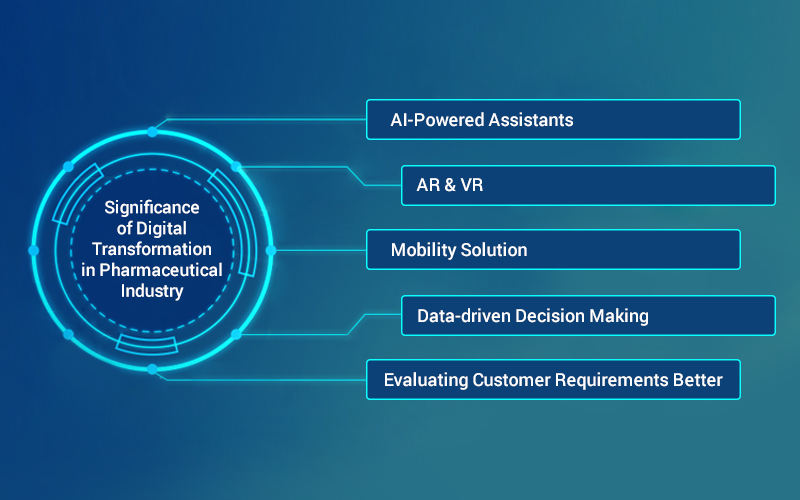With worldwide sales of more than a whopping $1228.45 billion in the year 2020, the pharmaceutical industry is one of the fastest-growing economic sectors. The pharmaceutical market has grown to a rapid annual rate of 5.8% since 2017 and has been escalating ever since. The emergence of COVID-19 has significantly impacted the pharmaceutical industry and in the wake of the pandemic, digitalized technology has proven to be more imperative than ever before. It has helped in authorizing firms across all sectors to enhance performance through adequate manufacturing productivity, more decisive competitive skills, and more accurate planning. Now, without further ado, let’s dive deeper into how digital innovation plays a critical role in the pharmaceutical industry.
Digital Transformation is the method of implementing software solutions or applications to the existing traditional strategies. A digital marketing agency uses these digital solutions to elevate business productivity and help the enterprise seamlessly adjust to current business trends, industry culture, and customer demands.
In a nutshell, it is the procedure of restructuring or redefining the business in the digital era to correspond to the evergrowing trends. Process, technology, data, and organizational change are the four primary elements of digital transformation. The three essential components of digital transformation are rebuilding customer relationships, rebuilding operations, and rebuilding procedures.
Also Read: How The Internet of Things (IoT) Has Revolutionized The Healthcare Industry
Digital transformation in the pharmaceutical industry is regarded as one of the most vital technological intakes for much enhanced patient care, amplified transparency, improved production, and drug development. Pharmaceutical businesses manufacture counterfeit-proof medications, which guarantees medicine’s authenticity, this is only possible with the help of digital transformation. Pharmaceutical companies are trying their very best to get their hands on the latest pieces of equipment as well as trying to keep up with the revolution brought about by digital technology. A few examples of innovations that are beginning to transform the healthcare industry include advanced analytics, mobile communications digital marketing, and the Internet of Things (IoT).
Now, let’s take a look at what digital transformation brings to the table for pharmaceutical industries.

Chatbots are now a huge part of digitalization, especially in the pharmaceutical industry, and are benefitting them at large. More advanced chatbots are being delivered into the field of medical sciences as new continuous developments in technology take place. The main advantage of a chatbot is that it enables pharma companies to assist users 24/7, without any hassle. Users can get spot-on, immediate responses and can get information regarding their health conditions, other information about various treatments, side effects, etc. The implementation of Artificial Intelligence (AI)-powered assistants not only improves organizational productivity but also assists to perform crucial tasks.
Augmented reality (AR) and virtual reality (VR) technologies have become an integral part of almost every industry. Pharmaceutical companies utilize AR and VR to bridge the gap between their business and consumers. The implementation of these technologies has just begun, and certain companies have already reached way ahead and have unlocked their full potential. Pharmaceutical industries can efficiently impart experiential information, illustrate an entire product catalog, and can conduct interactive drug research with the help of AR and VR. These technologies also help patients to actively participate in their healthcare courses.
Digitalization has benefited all industries for better online presence, and the same includes for pharmaceutical industries. Today, people can gain access to a variety of information available online regarding the pharma industry with the help of online forums, abundant content available, and of course, through different mobile apps. When mobility enters the picture of the IT strategy, pharmaceutical companies improve their operational agility and process automation. It also helps in minimizing the time gap in the decision-making process in mixed operations. Pharma companies have also realized that the adoption of mobilization can facilitate better customer engagement also. It also increases productivity and can drive sales easily.
Predictive modeling, industry collaboration, and clinical trials are the numerous ways in which Big Data assist the pharmaceutical industry. A pharmaceutical company, with the help of predictive modeling, can test a drug for a patient, as per the patient’s disease, genetics, etc. Big Data analytics can also be utilized for drug discoveries. This is possible by using algorithms to interpret data in the cloud. Clinical trials can also be conducted with the help of big data. Pharma companies and healthcare institutions collaborate with each other to widen their database for predictive modeling and upcoming clinical trials.
Also Read– What Is Azure Sphere? How Does It Help Organizations to Protect Their IoT Deployments?
Digitalization enables pharma companies to know their customer requirements better. It assists them to track online forums, helps to get good feedback, and analyzes data from different health apps. These insights will market them to the proper target audience and help to create products that the people require.
Today, digitalization is at its peak, many IoT services, along with AI services and robotic process automation services are forging into the field, and pharmaceutical companies are trying their best to keep up with the latest digital advancements. As for COVID-19, it has resulted in a huge toll on the industry and also resulted in delayed routine treatments and drug development and disrupted supply chains. Digital transformation in the pharmaceutical industry is vital for much-enhanced patient care, cost-effectiveness, and much better transparency.